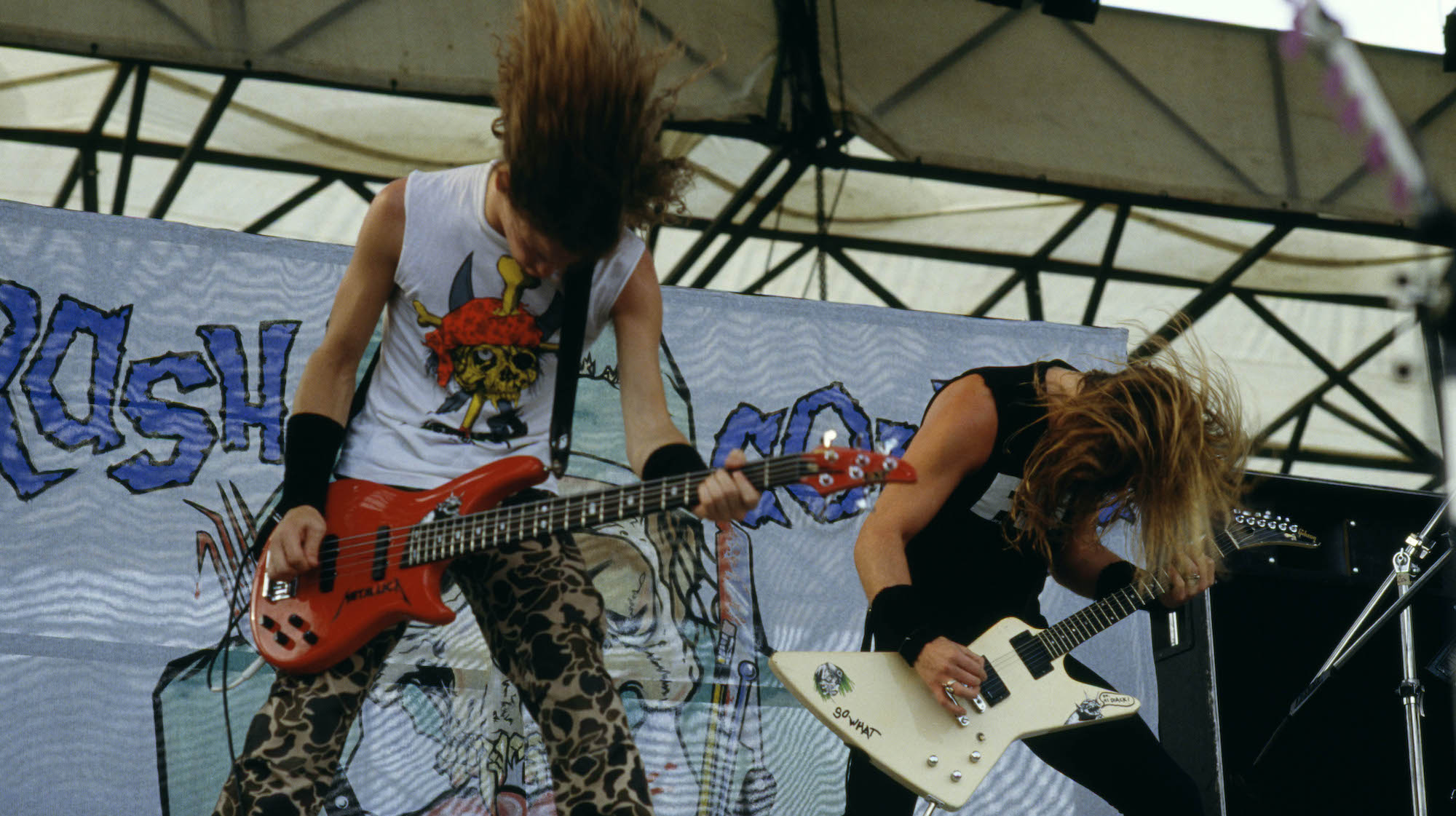Jason Newsted says he was “f*cking livid” when he first heard …And Justice For All
"I was out of my head, because I really thought I did well, and I thought I played how I was supposed to play,” the former Metallica bassist said

All the latest guitar news, interviews, lessons, reviews, deals and more, direct to your inbox!
You are now subscribed
Your newsletter sign-up was successful
The mix of Metallica's 1988 masterpiece, …And Justice For All has long been one of the most controversial artistic choices in the metal titans' discography (rivaled only by That Drum Sound on their famously polarizing 2003 effort, St. Anger).
In short, in case you didn't already know, on …And Justice For All, the bass playing of then-newcomer Jason Newsted – who replaced original bassist Cliff Burton after his tragic death in 1986, in a tour bus crash – was mixed low enough to render it almost inaudible.
Though fans have long been quite vocal about their distaste for the mixing decision, Newsted himself hasn't rocked the boat too much about it in the three-plus decades since. In a new interview with Metal Hammer’s Stephen Hill, however, Newsted revealed the depths of his shock and fury when he heard the final mix of the record.
“I was fucking livid!,” Newsted said. “Are you kidding me? I was ready [to go] for throats, man!”
“No, I was out of my head, because I really thought I did well,” he elaborated. “And I thought I played how I was supposed to play.”
Newsted went on to reflect on how the frameworks of Metallica songs were almost always worked out (as they are to this day) by James Hetfield and drummer Lars Ulrich before recording, and how this affected their decision-making in regards to the mix.
“Lars and James were the original garage band duo, as far as that goes,” he says. "They always made the records that way, from [the 1982 demo cassette] No Life ’Til Leather, it was Lars and James, guitar and drums. On the original No Life ’Til Leather cassette – if you happen to ever see a real copy or a photo of a real copy – in Lars’ handwriting, in ink pen, on the label of the cassette, [it reads] ‘Turn bass down on stereo’. On No Life ’Til Leather!”
All the latest guitar news, interviews, lessons, reviews, deals and more, direct to your inbox!
“They mixed it how it was supposed to be mixed: there’s the bass and there’s the guitar from all the way back. But Lars didn’t want [that] because it messed with his drums somehow, so when he sends the demo out to fucking Combat Records and wherever, [his instruction is] ‘Turn the bass down before you even listen to this.’ Before you even get it going, just turn the bass down.
"Right from the get go. Before you even start. That’s where he’s been his whole goddamn life, so why would it be any different when it came to […And Justice For All]? They made Kill ’Em All that way, they made Ride… that way, they made Master… that way, all of them. Those two guys in a room [mimics drum beats and playing], that’s the way it always happened. [For] the most successful metal band of all time. So you argue with this shit? I’m not really sure.”
“Now it’s become the best garage band album ever [for artists such as] Black Keys, White Stripes, Duo Jets, the different ‘power duos’ of garage stuff.”
Hetfield, Ulrich and lead guitarist Kirk Hammett – who remain with the band to this day, while Newsted departed in 2001 – have all individually defended the mix in the intervening years.
“The bass was obscured [on Justice] for two reasons,” Hetfield told Guitar World in 2008. “First, Jason tended to double my rhythm guitar parts, so it was hard to tell where my guitar started and his bass left off. Also, my tone on Justice was very scooped – all lows and highs, with very little midrange. My guitar sound ate up all the lower frequencies. Jason and I were always battling for the same space in the mix.”
In a December 2008 interview with Decibel, Hammett offered a similar rationale for the decision.
“The reason you can't hear the bass so well is because the bass frequencies in Jason's tone kinda interfered with the tone that James was trying to shoot for with his rhythm guitar sound, and every time the two blended together, it just wasn't happening,” Hammett said. “So the only thing left to do was turn the bass down in the mix. It was unfortunate.
“It was an experiment, too. We were totally going for a dry, in-your-face sound, and some people really like that sound. A lot of the newer-generation bands, especially, think that album sounds great. But at the end of the day, it was an experiment. I'm not really sure it was 100 percent successful, but it is a unique sound that that album has.”
Ulrich, for his part, maintained that there was no malice in the decision in the same interview, saying, “No, it wasn't intentional. Justice… was the James and Lars show from beginning to end, but it wasn’t, ‘Fuck this guy – let’s turn his bass down.’ It was more like, ‘We're mixing, so let's pat ourselves on the back and turn the rhythms and the drums up.’ But we basically kept turning everything else up until the bass disappeared.” (Laughs)
“If the Justice… album had been mixed like a regular record, we wouldn’t be talking about it right now,” Newsted himself offered in conclusion. “It would’ve did what it did and we still would say it sells a couple thousand copies a year, or month, or week, whatever, and it does its thing, and it just sounds like it sounds and there you go. But because of the way it all came out, it became such an unnecessary big fucking deal, [and] we’re still talking about it again. I think it was brilliant they didn’t even realize how fucking brilliant they were in their drunk stupor to do what they did!”
Jackson is an Associate Editor at GuitarWorld.com. He’s been writing and editing stories about new gear, technique and guitar-driven music both old and new since 2014, and has also written extensively on the same topics for Guitar Player. Elsewhere, his album reviews and essays have appeared in Louder and Unrecorded. Though open to music of all kinds, his greatest love has always been indie, and everything that falls under its massive umbrella. To that end, you can find him on Twitter crowing about whatever great new guitar band you need to drop everything to hear right now.




